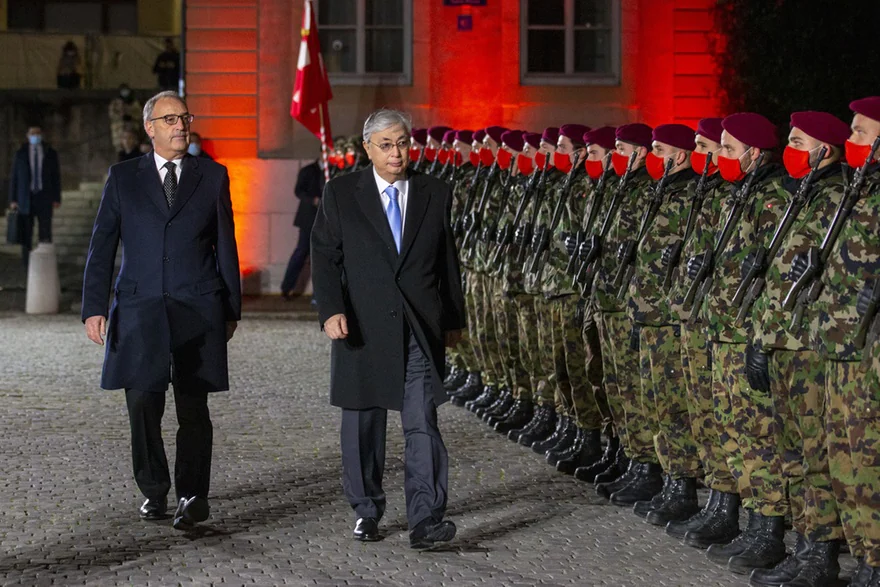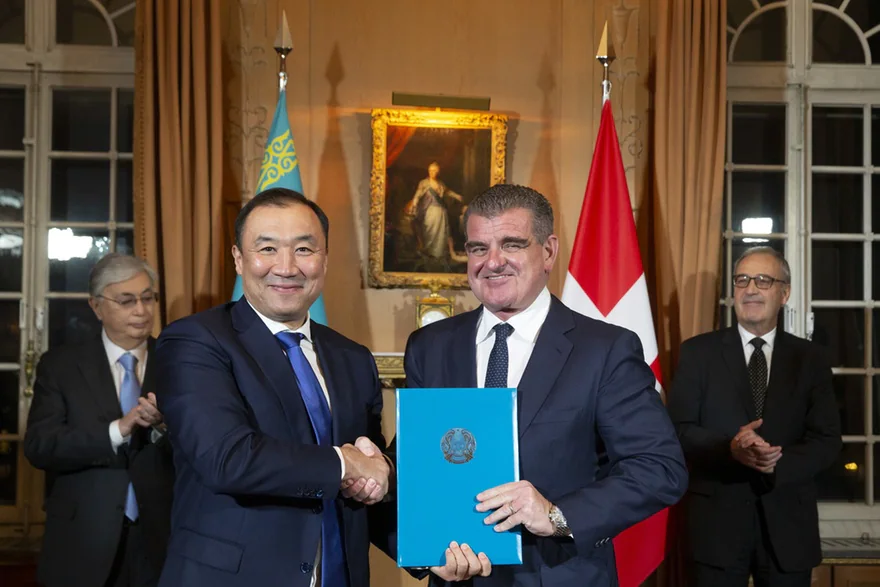The example of Kazakhstan shows that in Swiss foreign relations, economic interests sometimes collide with commitment to democracy and human rights.

The constitution obliges Switzerland to promote democracy. The country takes this task seriously. But especially in countries that are of particular importance for the economy, foreign policy occasionally gets into a quandary. On the one hand, it should talk to dubious regimes about democracy and human rights. On the other hand, she concludes lucrative contracts with them.
The risk here is a veritable conflict of goals: the close economic ties with Switzerland, the model country of democracy, can not only serve dictators for enrichment. Sometimes they also legitimize their existence.
Kazakhstan in Central Asia: Almost 19 million people live in the second largest successor state to the Soviet Union. Tens of thousands took part in protests against the country’s government at the beginning of the year. The unequal distribution of public goods has led to the social explosion. According to observers, the government, with the support of troops from other post-Soviet states, violated human rights in cracking down on the protests.
“People are tired of the lies of those in power,” Gazinur Gizdatov, a professor at the Abylai Khan Kazakh University of International Relations, told SWI swissinfo.ch. However, according to Gizdatov, it still remains to be seen “whether change is still possible in our country”.

Nurlan Sauranbayev, left, the chairman of Kazakhstan’s state railway company NC Kazakhstan Temir Zholy, and Peter Spuhler, right, the president of Stalder Rail, pose after signing a strategic cooperation agreement at the Zoubov Foundation in Geneva, Switzerland, Monday, November 29 2021, in the presence of Kazakh President Kassym-Jomart Tokayev, left, and Swiss President Guy Parmelin, right. Keystone / Salvatore Di Nolfi
Doubts are justified, because the Central Asian dictatorship under President Kassym-Jomart Tokayev, which is rich in raw materials, not only has powerful allies in neighboring Russia — but also reliable partners, for example in Switzerland.
The Swiss business association Economiesuisse writes: “For many Swiss companies, Kazakhstan is the gateway to Central Asia. The country has significantly improved its market access conditions for foreign companies in recent years. Between 2005 and 2018, Swiss companies spent 23.2 billion dollars in this former Soviet republic invested.”
Switzerland’s third largest direct investor
This makes Switzerland the third largest direct investor in Kazakhstan, after the Netherlands and the USA. Swiss exports to Kazakhstan increased by 16.2% in 2018 alone. At the end of November 2021, both countries signed a number of declarations of intent and preliminary agreements in Geneva. This includes projects in the areas of sustainable development, public transport, road construction, genetic engineering, pharmaceuticals, financial services, animal husbandry or plastics – the whole spectrum.
Among others, the Swiss train manufacturer Stadler Rail is interested in a close cooperation with the Kazakh state railway company “Qasaqstan Temir Scholy”.
Controversial political ties
Parallel to the economic relations, the bilateral ties between the two countries are also being strengthened. Last year, the presidents of the two countries, Guy Parmelin and Tokayev, signed two trade development agreements.
For Tokayev it was a welcome appearance on the international stage. In addition to business, they also talked about such noble topics as a ban on cluster munitions, the fight against the pandemic, Afghanistan and water diplomacy.
Switzerland was more about business: the country occupies a strategic position between Russia and China. Beijing is building roads, railways and pipelines in Kazakhstan as part of its global “New Silk Road” initiative. And the Kazakh authorities plan to privatize some of their state-owned companies. Swiss companies sense business accordingly.
Villa
According to research by the Tages-Anzeiger, the dictator’s daughter Dinara Kulibaeva bought the Château de Bellerive on Lake Geneva for over a hundred million francs at the end of 2021. DR
At the same time, people in Bern are well aware that the government in Kazakhstan is an authoritarian post-Soviet regime which — as just demonstrated — is capable of uncompromising and rock-hard action against its own people.
An incident involving Kazakhstan, which even called into question the independence of Swiss parliamentary operations, was also the subject of heated debate in Switzerland from 2015 onwards. It was about an initiative by the liberal parliamentarian Christa Markwalder, who addressed the relationship between the two countries.
Media research revealed that the government of Kazakhstan, through an international PR agency, was responsible for this initiative, right down to the formulation of individual passages, without Christa Markwalder’s knowledge, as Markwalder later asserted. The so-called Kazakhstan affair became a textbook example of how a foreign state sought to influence Swiss politics.
The ex-president’s family
Further evidence of the close ties between the two states is Vitol, one of the largest Swiss corporations. The Swiss non-governmental organization Public Eye sees the Vitol Central Asia joint venture as a construct that on the one hand serves to hide the group’s connections to elites in Kazakhstan – and on the other hand to obtain lucrative contracts.
According to Public Eye research, Vitol Central Asia is a subsidiary of Ingma Holding, a Rotterdam-registered company with just 11 employees that turned over a whopping $93.3 billion between 2009 and 2016.
portrait
A portrait of former Kazakh President Nursultan Nazarbayev following clashes at the City Hall building in Almaty, Kazakhstan on Monday, January 10, 2022. Copyright 2022 The Associated Press. All rights reserved
According to Public Eye, Timur Kulibayev, the son-in-law of former Kazakh President Nursultan Nazarbayev, indirectly benefited from this joint venture. Kulibayev and his wife own a property in Anières, in the canton of Geneva, which they bought in 2009 for 74.7 million Swiss francs. In addition, according to research by the Tages-Anzeiger, the dictator’s daughter Dinara Kulibaeva bought the Château de Bellerive on Lake Geneva for over a hundred million francs at the end of 2021.
A Vitol spokesman told SWI swissinfo.ch that the company was not aware of any benefits Kulibayev allegedly received from Ingma. In this context, Public Eye has called on the Swiss government to increase transparency in commodities trading.
Stable Courant normal
For its part, the Swiss Foreign Ministry emphasizes that Bern is in constant contact with the Kazakh authorities and civil society there on questions of democratization and human rights. She is also closely following the ongoing trials of members of the Kazakh opposition.
Projects by local NGOs in the area of freedom of expression and migration are also supported. During official visits by Swiss delegations, representatives of civil society would usually be invited to a round table on democracy and human rights. That sounds normal for stable Courant.
Nursultan
Kazakhstan’s new capital has changed its name several times in recent years. Copyright 2022 The Associated Press. All rights reserved
For Kazakh political scientist Gaziz Abishev, it is unlikely that recent events will make Kazakhstan any less attractive. “The diplomats are working, so nothing bad should happen between Kazakhstan and Switzerland,” he assesses the situation.
The fact that Kazakhstan’s government withstood the uprising is proof of the stability of the country’s political system. Switzerland and Kazakhstan: “Pragmatic considerations prevail on both sides,” says Abishev.
Original article: Swissinfo